When most supplement companies formulate products, they focus on individual ingredients and their isolated effects. Soul Performance Nutrition, however, takes a fundamentally different approach -- one that understands our bodies function as interconnected systems rather than isolated parts.

Meridian Vitality Complex by Soul Performance Nutrition combines sesamin, vitamin D3, K2, delta-tocotrienols, and geranylgeraniol to form a metabolic shield enhancing bioavailability and supporting overall metabolic health through strategic nutrient synergy.
Meridian Vitality Complex is the embodiment of this philosophy. Rather than viewing nutrients in isolation, Soul Performance founder Matt Karich has crafted a formula that strategically leverages the synergistic relationships between carefully selected ingredients, creating what he describes as a "metabolic shield" that enhances the body's natural processes.
Soul Performance Nutrition Meridian Vitality Complex - A Strategic "Metabolic Shield"
Soul Performance has built a reputation for thoughtfully designed, evidence-based supplements that reflect a deeper understanding of nutritional biochemistry. Meridian Vitality Complex represents the culmination of this philosophy: a precisely calibrated synergy of Vitamin D3, Vitamin K2, sesamin, delta-tocotrienols, and geranylgeraniol (GG) that work together to support metabolic health at multiple levels.
What makes this launch unique is the focus on nutrient-nutrient interactions. Rather than simply providing individual nutrients with isolated benefits, Meridian Vitality Complex drives synergistic benefits with the strategic inclusion of sesamin, a natural CYP3A4 inhibitor. By preserving the concentration of other ingredients in the bloodstream and enhancing their tissue uptake, this shield magnifies their biological effects while creating a cascade of benefits across interconnected metabolic pathways.
The result is a supplement greater than the sum of its parts, designed to support insulin sensitivity, muscle function, vascular flexibility, inflammatory balance, and hormone production - all through a single, elegantly designed formula.
This article takes a deep dive into Karich's latest innovative creation, teaching us quite a few new things along the way. Before we get into the science, sign up for our Soul Performance Nutrition news alerts and check prices with PricePlow:
Soul Performance Nutrition Meridian Vitality Complex – Deals and Price Drop Alerts
Get Price Alerts
No spam, no scams.
Disclosure: PricePlow relies on pricing from stores with which we have a business relationship. We work hard to keep pricing current, but you may find a better offer.
Posts are sponsored in part by the retailers and/or brands listed on this page.
This area is reserved for Team PricePlow's upcoming videos.
Subscribe to our channel and sign up for notifications so you catch it when it goes live!
This article breaks the formula down ingredient-by-ingredient, but after that, also explains the general systems-biology philosophy behind Meridian:
Meridian Vitality Complex Ingredients
In a 2-capsule serving of Meridian Vitality Complex from Soul Performance Nutrition, you get the following:
-
Sesamin (from Sesame seed extract) – 150mg
The foundation of Meridian Vitality Complex's innovative formulation is sesamin, a powerful lignan found in sesame seeds that serves as the crucial "metabolic shield" protecting and enhancing the formula's other key ingredients.[1]
The "Metabolic Shield" Mechanism
What makes sesamin so valuable (and interesting) in Meridian is its ability to inhibit cytochrome P450 3A4 (CYP3A4), a major enzyme responsible for metabolizing numerous compounds in the liver.[2] This inhibition is why Soul Performance founder Matt Karich gives it so much focus, as it fundamentally changes how the other ingredients behave in your body.
By slowing the breakdown of compounds like delta-tocotrienols, vitamin D3, vitamin K2, and geranylgeraniol, sesamin effectively:
- Extends their half-life in circulation, allowing these nutrients to remain bioavailable in the bloodstream longer
- Enhances tissue uptake in key organs, including liver, muscle, and bone where metabolic benefits are most needed
- Amplifies their biological effects, creating synergistic interactions that wouldn't be possible at lower tissue concentrations
Multi-System Metabolic Benefits
Beyond the above role, sesamin itself offers impressive health benefits that complement the formula's other ingredients:
Fatty Acid Optimization
Sesamin is a potent regulator of fatty acid metabolism with dual mechanisms of action:
- Inhibition of fat synthesis: Sesamin decreases the activity of lipogenic enzymes including fatty acid synthase (FAS) and acetyl-CoA carboxylase (ACC) by down-regulating SREBP-1, a key transcription factor that controls fat production.[3]
- Enhancement of fat burning: Simultaneously, sesamin increases hepatic fatty acid oxidation through PPARα activation, boosting expression of enzymes that break down fats for energy.[4]
This dual action creates an optimal metabolic environment that supports insulin sensitivity – especially when combined with delta-tocotrienols and vitamin D3.
Vascular Health Support
Sesamin demonstrates significant vascular protective effects that enhance Meridian's overall metabolic benefits:
- Blood pressure regulation: Human clinical research shows that sesamin (60mg daily for 4 weeks) can reduce systolic blood pressure by 3.5 mmHg and diastolic pressure by 1.9 mmHg in mildly hypertensive subjects – effects that compound over time.[5]
- Endothelial function enhancement: Sesamin improves nitric oxide bioavailability and endothelium-dependent vasodilation, complementing vitamin K2's role in preventing arterial calcification.[6]
Inflammation and Oxidative Balance
Within this formula, sesamin contributes significant antioxidant and anti-inflammatory properties:
- Liver protection: Sesamin exhibits hepatoprotective effects by increasing antioxidant enzyme activity and reducing oxidative stress markers.[7]
- Inflammatory mediator regulation: Sesamin downregulates key inflammatory pathways including NF-κB signaling and reduces pro-inflammatory cytokines like TNF-α and IL-6.[8]
This anti-inflammatory activity creates a better environment for hormone receptor signaling, which is nice considering GG-Gold's testosterone-supporting properties.
Strategic Dosing at 150mg
Soul Performance's selection of 150mg of sesamin represents a scientifically strategic dose that:
- Provides sufficient CYP3A4 inhibition to create the metabolic shield effect
- Delivers direct metabolic benefits without overwhelming the body's detoxification systems
- Creates optimal synergy with the precise amounts of other formula ingredients
Clinical research demonstrates that dosages in the 100-200mg range effectively achieve these biological effects while maintaining an excellent safety profile.[9]
Sourcing Quality
Karich was sure to source high-quality sesamin extract from sesame seeds, ensuring optimal potency of the active lignans that achieve the results he sought. Unlike lower-quality extracts that may contain variable lignan content, this standardized extract delivers consistent results.
When placed into this formula's broader metabolic context, sesamin doesn't just deliver its own impressive health benefits – it fundamentally transforms how the other ingredients behave in your body, creating a truly synergistic formula greater than the sum of its parts.
-
DeltaGold (Tocotrienols from Annatto) – 50mg
At the heart of Meridian Vitality Complex's formula is DeltaGold, a specialized form of vitamin E derived from annatto seeds. Unlike most vitamin E supplements that focus on alpha-tocopherol, DeltaGold provides the more biologically potent delta-tocotrienol form of vitamin E.
The Superior Form of Vitamin E
While most consumers recognize vitamin E as a single nutrient, it actually encompasses eight different compounds – four tocopherols and four tocotrienols. Research indicates that tocotrienols possess significantly greater antioxidant power than the more common tocopherols, with delta-tocotrienol showing some metabolic benefits as well.[10]
What makes DeltaGold unique is its composition. Derived from annatto, it provides a naturally-occurring 90% delta-tocotrienol and 10% gamma-tocotrienol blend that's completely free of tocopherols. This matters because tocopherols can actually interfere with tocotrienol absorption and reduce their effectiveness.[11]
Metabolic Benefits Within the "Shield"
When incorporated into Meridian's formula and protected by sesamin's CYP3A4 inhibition, DeltaGold's delta-tocotrienols stay in circulation longer before breakdown, amplifying their natural benefits:
- Enhanced Insulin Sensitivity: Delta-tocotrienols have been shown to improve insulin signaling pathways and glucose utilization, especially when paired with optimal vitamin D status.[12]
- Reduced Inflammation: Research demonstrates delta-tocotrienol's ability to lower key inflammatory markers including hs-CRP, TNF-α, and IL-6 by up to 40%, creating an environment where hormone-receptor signaling can function optimally.[11]
- Liver Support: One of delta-tocotrienol's most impressive benefits is its ability to reduce hepatic steatosis markers and liver enzymes. In patients with non-alcoholic fatty liver disease, delta-tocotrienol supplementation decreased fatty liver index by approximately 15-17% and reduced oxidative stress markers.[13]
- Mitochondrial Protection: By countering oxidative damage and supporting cellular energy production, delta-tocotrienols create an optimal environment for mitochondrial function. These, of course, are the cellular powerhouses that drive metabolism.[14]
Discover the true power of Vitamin E with DeltaGold tocotrienols! Dr. Barrie Tan's groundbreaking research has shown tocotrienols' incredible antioxidant and anti-inflammatory benefits, surpassing traditional tocopherols.
Synergistic Interactions in Meridian Vitality Complex
What makes Meridian's formula innovative is how DeltaGold's delta-tocotrienols work synergistically with the other ingredients:
- With Sesamin: The inclusion of sesamin inhibits CYP3A4, an enzyme that normally breaks down tocotrienols in the liver. This protection extends DeltaGold's half-life in circulation, allowing for greater tissue uptake and enhanced antioxidant effects in muscle and liver cells.
- With Vitamin D3: Tocotrienols complement vitamin D3's role in supporting insulin sensitivity and muscle function. This synergy creates more comprehensive metabolic support than either nutrient could provide alone.
- With GG-Gold: Delta-tocotrienols work alongside geranylgeraniol to support mitochondrial function, with tocotrienols providing antioxidant protection while GG enhances cellular energy production through CoQ10 synthesis and protein prenylation.
The 50mg Sweet Spot
The 50mg dose of DeltaGold in Meridian represents a strategic amount – research suggests that lower doses (around 50-125mg) of delta-tocotrienols often outperform higher doses for certain metabolic benefits, with peak effectiveness for inflammatory markers and oxidative stress reduction observed at these levels.[11]
If you'd like to learn more, read our full article titled "DeltaGold: The REAL Vitamin E, Made from Tocotrienols".
-
GG-Gold (Trans-Geranylgeraniol from Annatto) – 150mg
Geranylgeraniol (GG), sold as GG-Gold by Dr. Barrie Tan's American River Nutrition, is an essential nutrient that's used as a side-chain in Vitamin K2 and is critical for biological functions including CoQ10 production, testosterone, muscle mass, bone health, gut health, and more!
Further at Meridian Vitality Complex's core lies GG-Gold, a naturally-sourced geranylgeraniol (GG) extract that represents what might be the most important essential nutrient you've never heard of. This small molecule plays a crucial role in cellular metabolism and energy production,[15] making it an ideal component in a metabolic support formula.
The Cellular Building Block You Need
Geranylgeraniol isn't just another supplement ingredient – it's a fundamental building block used throughout the entire biological world. Found naturally in many foods including olive oil, linseed oil, and rice, GG serves as a critical precursor for several essential compounds in the body:
- CoQ10 Synthesis: GG functions as a side chain for Coenzyme Q10, making it essential for proper mitochondrial function and cellular energy production.[16]
- Vitamin K2 Production: The body uses GG as a substrate to create the biologically active form of vitamin K2 (MK-4), which perfectly complements the MK-7 form included in this formula.[17]
- Protein Prenylation: Unlike many nutrients that merely support cellular processes, GG is directly incorporated into proteins through a process called prenylation, which is essential for proper muscle function and cellular signaling.[18]
Metabolic Benefits Enhanced by Sesamin
What we love about this formula is how the "sesamin shield" amplifies GG-Gold's effectiveness:
- Enhanced Muscle Function: By protecting GG from premature breakdown via CYP3A4 inhibition, sesamin allows greater tissue uptake where geranylgeraniol can help maintain muscle strength and prevent fatigue. Research shows that GG supplementation can completely prevent muscle fatigue in models of myopathy.[16]
- Glucose Metabolism Support: GG helps optimize insulin sensitivity and glucose homeostasis. Studies have demonstrated that GG supplementation improves glucose tolerance and insulin sensitivity in high-fat diet models.[19]
- Testosterone Production: Perhaps most surprisingly, GG-Gold has been shown to enhance testosterone production in a dose-dependent manner, making it valuable for hormone optimization – especially in men with lower baseline levels.[20-22]
- Reduced Inflammation: GG-Gold works synergistically with delta-tocotrienols to create a comprehensive anti-inflammatory effect, with GG specifically reducing pro-inflammatory cytokine production in adipose tissue.[23]
The Critical Link to Vitamin K2 and D3
One of the most elegant aspects of Meridian's formulation is how GG-Gold connects with the vitamin K2 and D3 components:
- Optimized Vitamin K Activity: While the formula provides MK-7 directly, GG also serves as a precursor for the body's endogenous production of MK-4 (another form of vitamin K2), lending to even better vitamin K status.[24]
- Enhanced Bone Health: Through this vitamin K2 connection, GG helps inhibit osteoclast formation (cells that break down bone) while the vitamin D3 component stimulates osteoblast activity (cells that build bone), creating ideal conditions for bone health.[17]
The 150mg Dose
Soul Performance didn't choose the 150mg dose randomly -- this amount lands at the evidence-based sweet spot for metabolic benefits. Clinical research examining GG-Gold at this dose has shown significant improvements in various biomarkers of health, with human studies demonstrating a 7.5% increase in total testosterone and approximately 15% increases in free and bioavailable testosterone in men with lower baseline levels.[22]
Safety Through Natural Sourcing
GG-Gold is extracted from the annatto plant -- the same natural source as the DeltaGold vitamin E tocotrienols discussed above. American River Nutrition's natural extraction process ensures a high-quality form of GG that the body recognizes and utilizes efficiently.
If you want to learn more about this fascinating ingredient, check out our comprehensive article titled "GG-Gold (Geranylgeraniol): The Most Important Essential Nutrient You've Never Heard Of".
-
Vitamin D3 (as Cholecalciferol) – 62.5mcg (2,500 IU) (313% DV)
Strategically included in Meridian Vitality Complex is vitamin D3 (cholecalciferol), dosed at 2,500 IU per serving. While many recognize vitamin D for its role in immunity and calcium regulation,[25] it also supports metabolic function, and when protected by sesamin, these benefits could be extended further.
Beyond Bone Health: Vitamin D as a Metabolic Regulator
Vitamin D functions like a hormone in the body, with vitamin D receptors (VDRs) found in nearly every tissue type. This widespread distribution underlies the molecule's comprehensive metabolic impact:
- Insulin Sensitivity Enhancement: Research shows that adequate vitamin D status correlates with improved insulin sensitivity and glucose metabolism. In fact, VDRs in pancreatic β-cells enable vitamin D to directly influence insulin secretion through calcium regulation.[26]
- Muscle Function Optimization: Vitamin D receptors are also in skeletal muscle, enabling direct effects on protein synthesis and muscle metabolism. Research correlates low vitamin D levels with loss of strength,[27] and some research shows that correcting vitamin D deficiency can improve muscle strength and metabolic function.[28]
- Immune System Regulation: Vitamin D supports both innate and adaptive immunity, shifting the immune response toward a more anti-inflammatory state. This creates an optimal environment for metabolic function by reducing inflammatory interference on the insulin signaling system.[25]
Synergistic with Vitamin K
Discussed in detail below, the D3-K2 combination creates what Karich describes as a "calcium traffic director" -- vitamin D enhances calcium absorption while K2 ensures proper calcium utilization, directing it to bones rather than soft tissues.[29] This synergy supports both metabolic and structural health.
A reasonable dosage
The 2,500 IU dose represents an evidence-based sweet spot that ensures adequate vitamin D status without overloading the body's regulatory systems. Research shows that daily doses between 1,000-4,000 IU appear to provide optimal benefits while minimizing potential risks for most adults.[30,31]
For instance, the LeBoff et al. VITAL trial studied 2,000 IU daily over a long period and found it did not increase falls or fracture risk, suggesting this dose is safe for long-term use.[32]
The goal should be maintaining healthy serum 25(OH)D levels between 30-50 ng/mL for most individuals, which typically requires moderate, consistent supplementation unless one spends much of their time outside in the sun with skin exposed.
Too Much Cholecalciferol Can Be Detrimental
We do urge caution on vitamin D3 mega-dosing, as extremely high doses don't offer additional benefits and carry added risks, especially when administered as bolus doses.[33-35] Evidence suggests that excessive vitamin D3 supplementation may induce hypercalcemia (elevated blood calcium) through calcium sequestration.[36-40] Clinical hypercalcemia (which can manifest as soft tissue calcification, kidney stones, cardiovascular complications, and renal damage) typically occurs at serum 25(OH)D levels above 150-200 ng/mL, which generally requires sustained intake exceeding 10,000 IU daily.[37]
To combat this issue, combining vitamin D with vitamin K2 may help direct calcium to bones rather than soft tissues, especially at higher vitamin D doses.[29] This brings us to the next ingredient, Vitamin K2:
-
Vitamin K2 (as Menaquinone-7) – 120mcg (100% DV)
Completing Meridian Vitality Complex's nutrient quartet is vitamin K2 (as menaquinone-7 or MK-7), a fat-soluble vitamin that works in coordination with vitamin D3[29] while gaining substantial potency through sesamin's extended effect.
The Calcium Traffic Director
While vitamin D3 enhances calcium absorption, vitamin K2's critical role is ensuring calcium reaches the right destinations in your body. MK-7 achieves this by activating two key proteins:
- Osteocalcin: This vitamin K-dependent protein binds calcium to the bone matrix, enhancing bone mineralization and strength.[41]
- Matrix Gla Protein (MGP): When activated by vitamin K2, MGP prevents calcium from depositing in soft tissues like arteries and organs, protecting vascular flexibility.[42]
This complementary action with vitamin D creates what Karich describes as a "calcium traffic director", optimizing calcium's beneficial effects while minimizing its potential risks.
MK-7: A Powerful Form of K2
Soul Performance specifically chose menaquinone-7 for its superior pharmacokinetic profile compared to other vitamin K forms:
- Extended half-life: MK-7 has a remarkably longer half-life (approximately 72 hours) compared to vitamin K1 (1-2 hours), allowing for stable blood levels with once-daily dosing.[41]
- Enhanced bioavailability: MK-7 shows greater bioavailability than other forms of vitamin K, with better distribution to peripheral tissues including bones and arteries.[43]
- Complementary to GG-Gold: While MK-7 provides direct vitamin K2 activity, GG-Gold serves as a precursor for the body's synthesis of another form of K2 (MK-4), creating comprehensive vitamin K status.[24]
Meanwhile, within Meridian's formula, sesamin's inhibition of CYP3A4[2] creates an extended effect on vitamin K2's activity, leading to prolonged circulation time by slowing hepatic breakdown.
Beyond Bone: K2's Metabolic Benefits
While bone health is vitamin K2's most well-known benefit, newer research reveals additional metabolic roles:
- Insulin sensitivity support: MK-7 may help regulate glucose metabolism through its interactions with osteocalcin, which influences insulin secretion and sensitivity.[44,45]
- Mitochondrial protection: Vitamin K2 supports mitochondrial function with its electron carrier capabilities.[46]
- Inflammation modulation: MK-7 has anti-inflammatory properties.[47]
The 120mcg dose provides 100% of the Daily Value while remaining safe for long-term use, synergizing with the formula's other components while avoiding any concerns associated with higher doses.
Next up, we get to the two powerhouse ingredients from American River Nutrition:
The Systems-Biology Philosophy Behind Meridian
While most supplement companies approach formulation in a straightforward "ingredient-by-benefit" manner, Soul Performance's Meridian Vitality Complex represents a more sophisticated systems-biology approach. We expect no less from Matt Karich after listening to him on Episode #068 of the PricePlow Podcast. Rather than simply combining isolated nutrients, he masterfully orchestrated a formula where each component plays multiple roles in an interconnected metabolic symphony.
Strategic CYP3A4 Inhibition for Enhanced Bioavailability
At the heart of Meridian's innovation lies a strategic mechanism that fundamentally changes how nutrients behave in your body. Sesamin serves as the cornerstone of this approach by inhibiting cytochrome P450 3A4 (CYP3A4), a major enzyme responsible for metabolizing numerous compounds in the liver.[2]
This inhibition creates the "metabolic shield", with cascading effects throughout the formula:
- Extended Circulation Time: By slowing the hepatic breakdown of delta-tocotrienols, vitamin K2, vitamin D3, and geranylgeraniol, sesamin allows these nutrients to remain bioavailable in the bloodstream 2-3 times longer than they would alone.[1]
- Enhanced Tissue Uptake: The extended circulation time enables greater absorption into target tissues like muscle, bone, and arteries, where these nutrients exert their biological effects. This is especially important for fat-soluble nutrients like vitamins D3 and K2, which require specific transport mechanisms to reach their intended sites of action.[48]
- Magnified Biological Effects: Through this bioavailability enhancement, nutrients can achieve higher tissue concentrations, unlocking effects that wouldn't be possible at lower levels. For example, the vitamin D3-K2 relationship works optimally when both nutrients reach sufficient tissue concentrations simultaneously.[49]
Metabolic Optimization Through Multiple Pathways
Meridian's formula strategically targets multiple interconnected metabolic pathways simultaneously:
Fat Metabolism Regulation
The formula creates a wide-scale approach to fat metabolism through complementary mechanisms:
- Sesamin decreases lipogenesis (by down-regulating SREBP-1) while increasing fatty acid oxidation through PPARα activation.[3]
- Delta-tocotrienols enhance insulin sensitivity and reduce inflammatory markers that can interfere with healthy fat metabolism.[12]
- Vitamin D3 may enhance insulin sensitivity.[50]
This multi-target approach creates an optimal environment for fat metabolism that no single ingredient could achieve alone.
Calcium Homeostasis Coordination
Meridian Vitality Complex intelligently manages calcium metabolism through a coordinated system:
- Vitamin D3 enhances calcium absorption from the digestive tract and mobilizes calcium from internal stores
- Vitamin K2 (MK-7) activates osteocalcin and matrix Gla protein (MGP), ensuring calcium is properly directed to bones rather than soft tissues
- GG-Gold functions as a precursor for endogenous MK-4 production, further enhancing vitamin K status
Together, these nutrients form what Karich describes as a "calcium traffic director" that optimizes both bone health and vascular flexibility by ensuring calcium reaches the right destinations in your body.
The one thing we'd be sure to add here is enough magnesium - both oral and topical.
Mitochondrial Energy Production Support
The formula provides comprehensive mitochondrial support through multiple synergistic mechanisms:
- GG-Gold serves as a critical building block for CoQ10 synthesis and protein prenylation, both essential for mitochondrial function
- Delta-tocotrienols provide antioxidant protection for mitochondrial membranes, preserving their integrity during energy production
- Sesamin reduces oxidative stress through multiple mechanisms, creating an environment where mitochondria can function optimally
This multi-component approach protects mitochondria while simultaneously enhancing their functional capacity. The entire approach creates what systems biologists call "network medicine" -- targeting interconnected biological networks rather than isolated pathways in order to achieve more comprehensive and sustainable effects. In short, the final product is greater than just the sum of the parts.
By considering nutrient-nutrient interactions, Soul Performance has created a formula that basically upgrades how these nutrients behave in your body, unlocking synergies that wouldn't be possible with isolated supplementation.
How to Use Meridian Vitality Complex
Soul Performance Nutrition recommends taking 2 capsules daily of Meridian Vitality Complex for optimal results. While the label doesn't specify timing, there are several strategic approaches to consider:
Timing Considerations
For most users, taking Meridian with a meal containing some dietary fat will enhance the absorption of its fat-soluble contents. Sesamin's effects work regardless of timing, but consistent daily use is key for maintaining steady blood levels of these nutrients.
Some users may find benefits from taking Meridian in the evening, as the formula's anti-inflammatory and metabolic support properties create an optimal physiological environment during overnight recovery processes.
Stacking Options
While Meridian Vitality Complex stands perfectly on its own, it can be strategically paired with:
- Magnesium supplements: Magnesium works synergistically with vitamin D3 and K2 for optimal calcium metabolism and numerous enzymatic processes
- Omega-3 fatty acids: These complement Meridian's anti-inflammatory properties while supporting cardiovascular health
- Protein supplements: The metabolic support from Meridian creates a great environment for protein utilization, make sure (always!) that you get enough protein
Conclusion: A New Approach to Metabolic Support
Well this article got complicated, but a complex supplement demands complex explanations!
Meridian Vitality Complex represents a modern twist in advanced supplement formulation. While most products follow the conventional approach of combining isolated nutrients, Soul Performance Nutrition has embraced a perspective that recognizes our bodies as interconnected networks rather than collections of independent parts.
The result is a supplement designed to support numerous areas of metabolic wellness rather than just targeting isolated biomarkers. This approach is precisely what makes Soul Performance Nutrition stand out in an increasingly crowded supplement industry... they're not just combining ingredients, they're orchestrating the next level of improvements.
For anyone seeking to support their body's fundamental metabolic processes, especially with respect to maintaining optimal energy production, insulin sensitivity, bone health, and inflammatory balance, Meridian Vitality Complex offers a sophisticated solution that reflects the cutting edge of nutritional science.
Soul Performance Nutrition Meridian Vitality Complex – Deals and Price Drop Alerts
Get Price Alerts
No spam, no scams.
Disclosure: PricePlow relies on pricing from stores with which we have a business relationship. We work hard to keep pricing current, but you may find a better offer.
Posts are sponsored in part by the retailers and/or brands listed on this page.
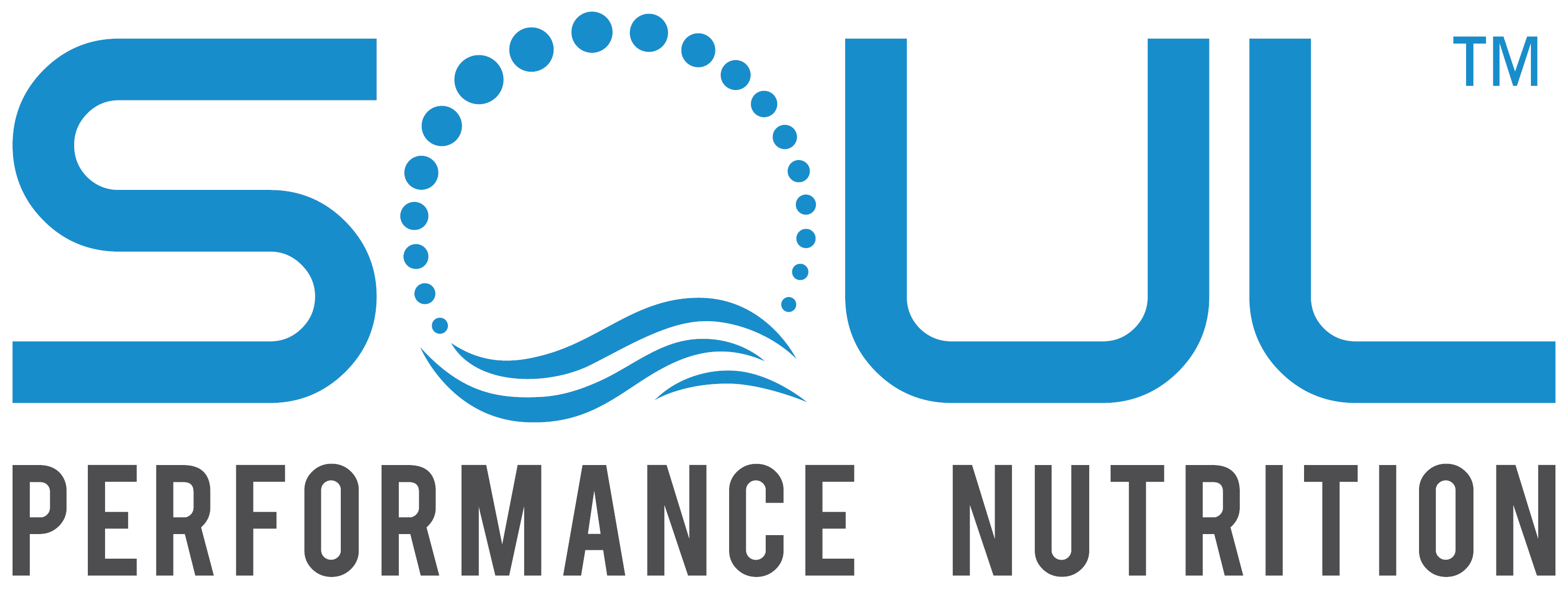



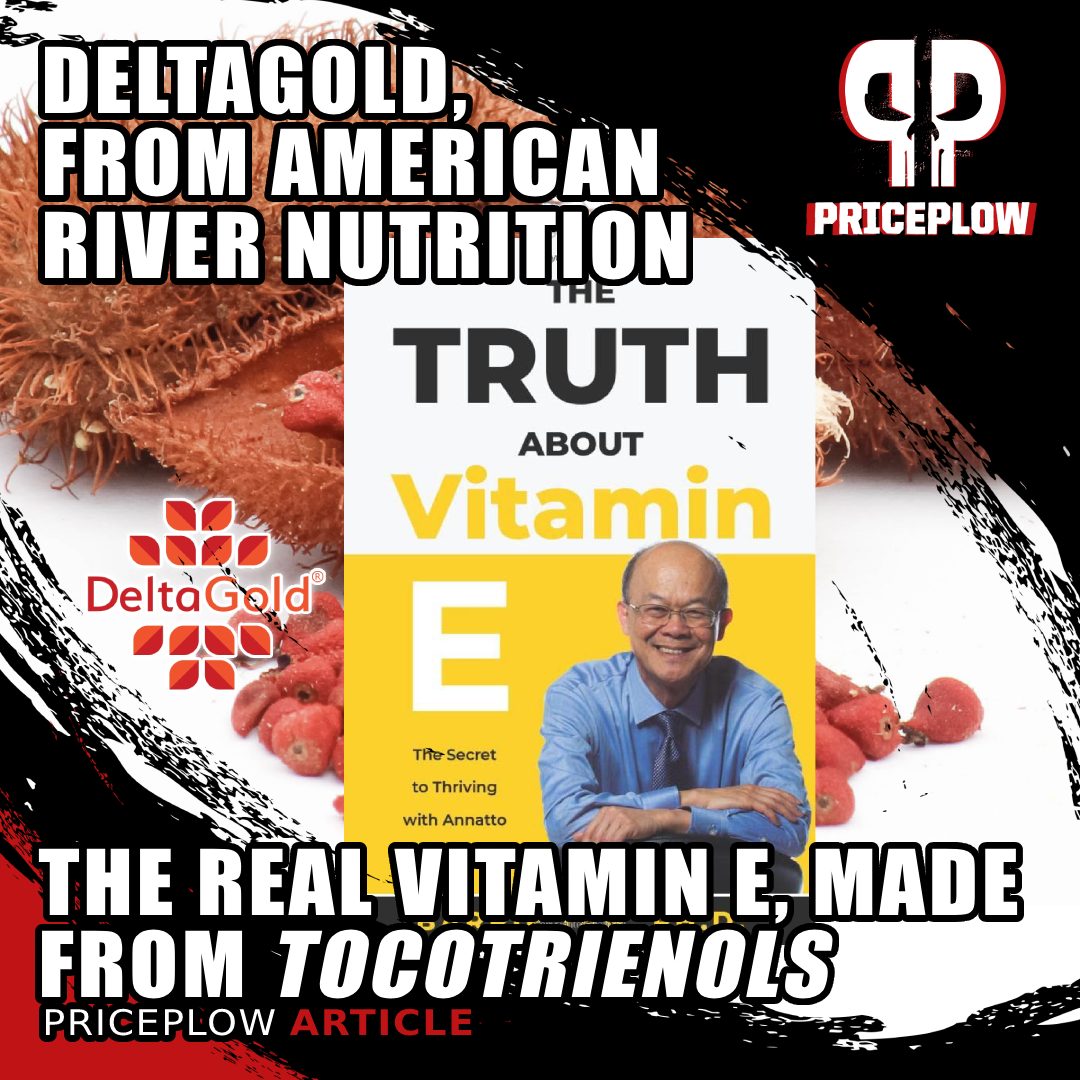

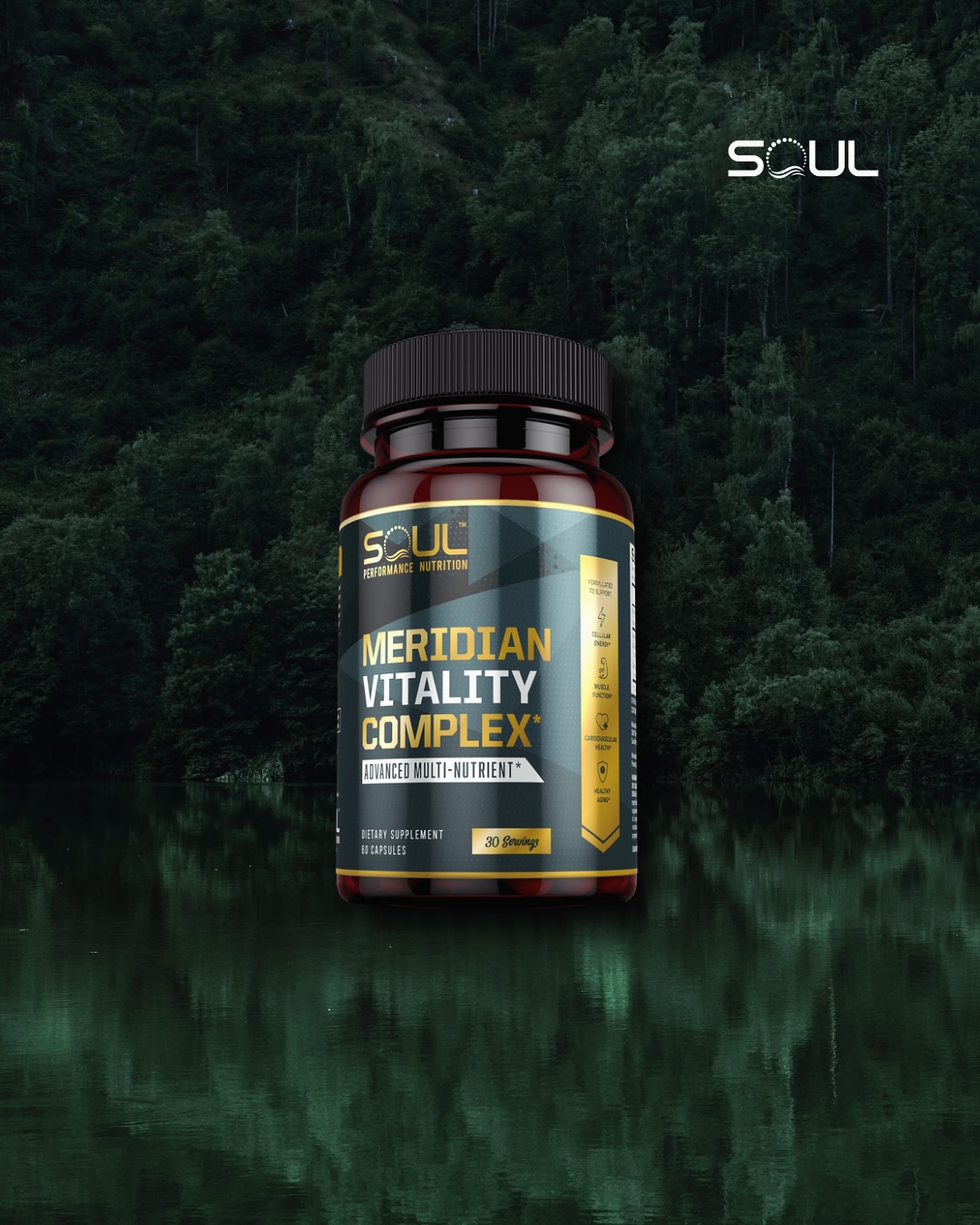
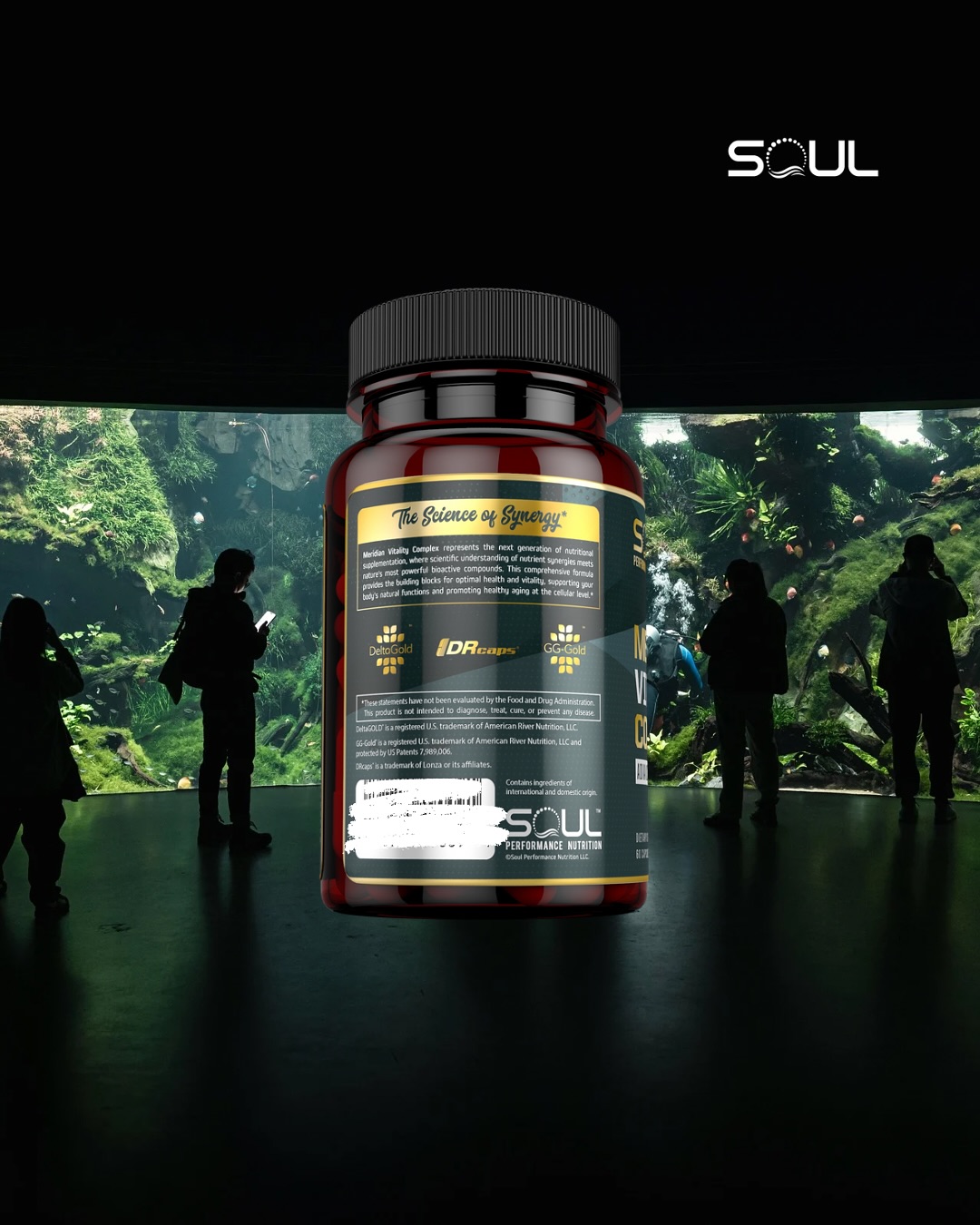

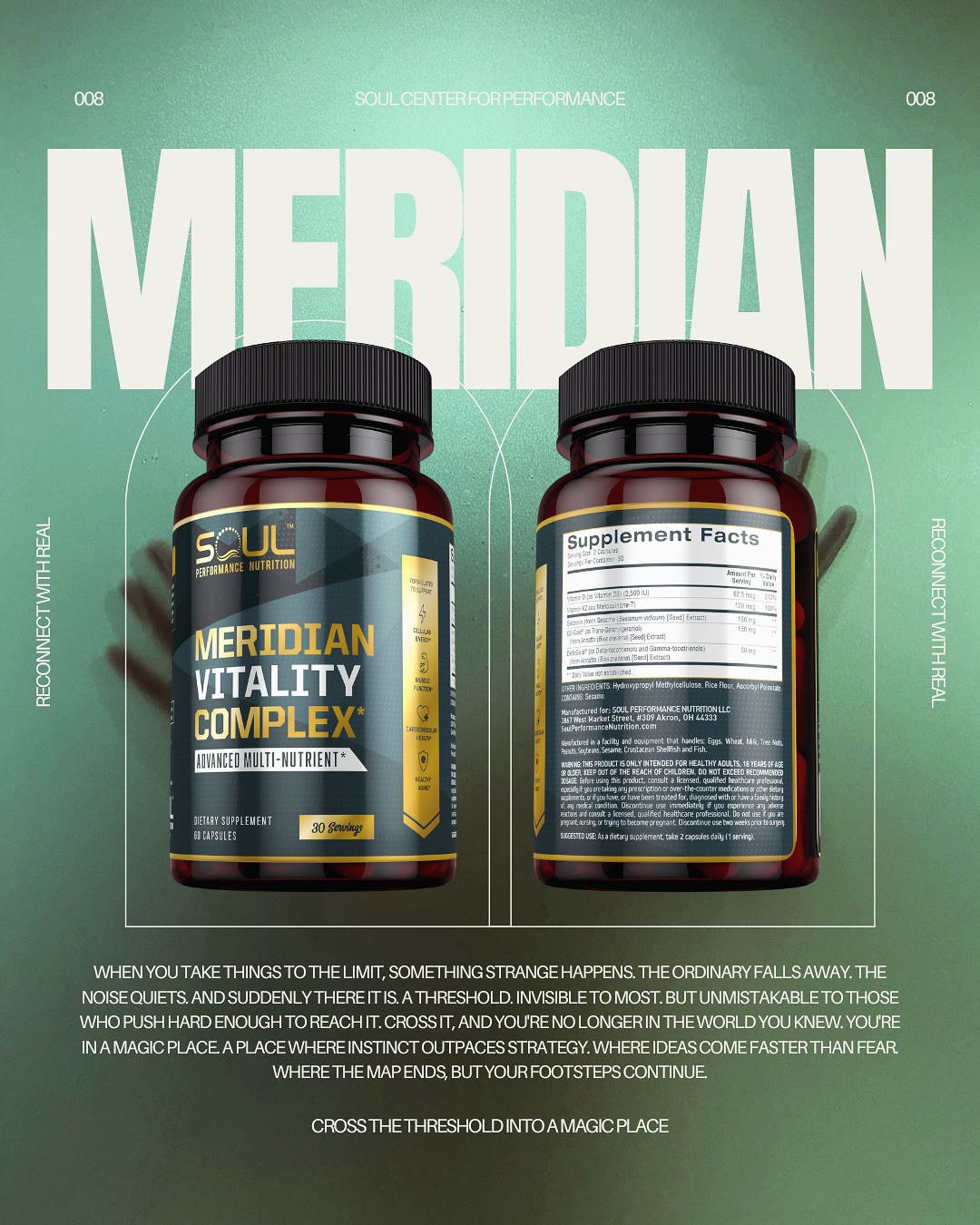

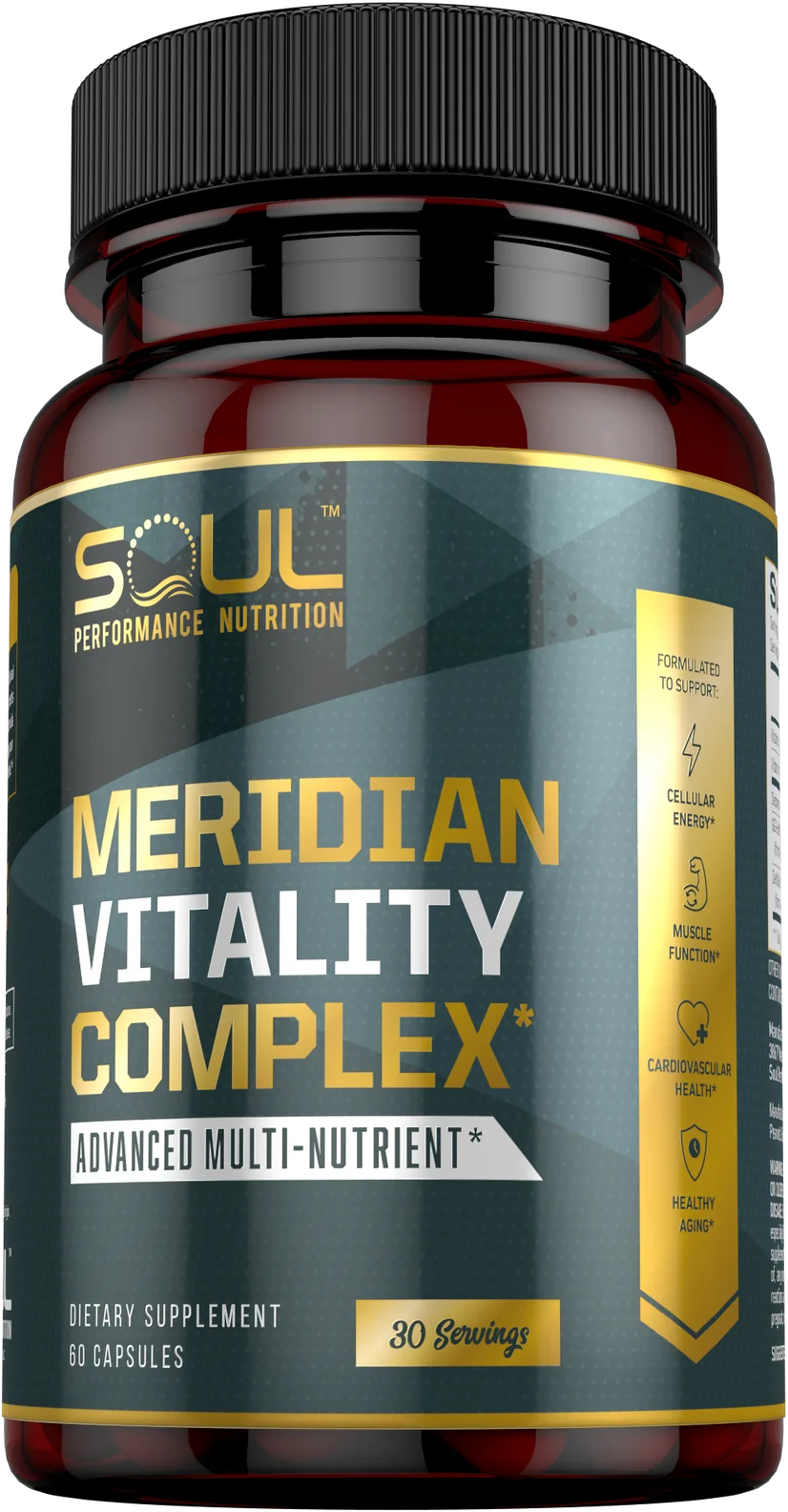



Comments and Discussion (Powered by the PricePlow Forum)